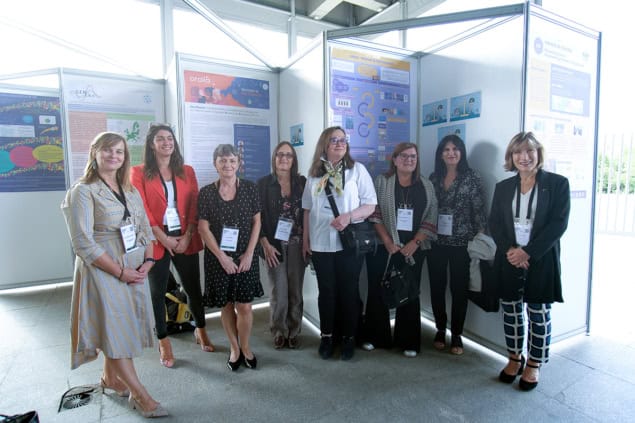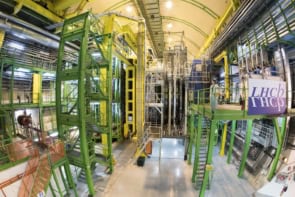Elizabeth Pollitzer says measures must be taken to tackle the gender imbalance among staff and users of large research infrastructures

Investments in “big-science” projects, whether it’s the next particle collider or a new synchrotron, are often justified in terms of the benefits for science, such as the discovery of a new particle or the opening of a new vista on the cosmos. The positive impact of large facilities on society and the economy are often cited too, such as spin-off technologies in medical physics. Gender equality, however, is rarely acknowledged as a necessary objective when building these multi-billion-euro facilities or investing in the research required to develop them. That lack of focus on gender equality is something that I believe must change.
The lack of gender-based targets for big science is laid bare in a tool created as part of the European Union’s Horizon 2020 funding programme. Produced by the Research Infrastructure Impact Assessment Pathways project, it assesses the impact of research infrastructures on the economy and society via 122 “impact indicators” in four areas: human resources; policy; society; and economy and innovation. But only one indicator – contribution to gender balance in society – gives any mention to gender equality.
Yet improvements can be made when it comes to supporting female scientists in big science. Take the EU-wide ATTRACT project, which funds the development of breakthrough technologies via proof-of-concept projects. It is led by large research organizations such as the CERN particle-physics laboratory near Geneva, the X-ray Free Electron Laser in Hamburg, Germany, and the European Southern Observatory. Between 2018 and 2020, ATTRACT supported 170 projects, half of which focused on health, environment and biological and related sciences. However, only 11% of the funded ATTRACT projects had a woman as the principal investigator, even though women receive almost half of doctoral degrees in those areas.
Such numbers tell us we have a long way to go. After all, big-science facilities receive significant amounts of public money and employ thousands of people in different professional roles. We need to promote big science as a career destination not only for science graduates but also those in law, management and policy. Monitoring gender balance among the staff and users of research infrastructures and the members of big-science projects is crucial to ensuring that women graduates, who outnumber men in Europe, see big science as a place where they can thrive professionally.
In that regard, there have been some positive developments. The EU’s €96bn Horizon Europe programme – the successor to Horizon 2020 – now requires that all benefiting organizations, many of which participate in big-science projects, have a gender equality plan. Several industry sectors are also doing lots to integrate equality, diversity and inclusion into human resources practices to attract talent.
Tapping into the talent pool
But more needs to be done. That’s why since 2020 the Women in Big Science Business Forum (WBSBF) has been promoting gender equality as part of the Big Science Business Forum (BSBF). The WBSBF was set up by a group of people at Fusion for Energy, which manages the EU’s contribution to the ITER fusion experiment being built in France. The BSBF itself is trying to advance gender equality across research infrastructures, universities and supplier companies. For instance, since research infrastructures distribute billions of euros of public money in procurement and investment, they can adopt procurement processes that question the supplier’s compliance with gender-equality legislation and ask for examples of efforts they have made to recruit and retain women.
“Gender budgeting” is a tool that big-science projects can also use to assess how their budget decisions impact gender equality. That could mean eliminating the gender pay gap, making provisions for equal parental leave or ensuring that research grants are the same for projects whether led by women or men. Budgets could also be earmarked to help staff achieve a work–life balance. I think it’s important as well that we improve training in gender equality and that we “gender proof” recruitment by identifying and removing potential biases to assessment criteria that could favour men. Big-science projects can also make use of the European Charter & Code for Researchers, which includes a dozen gender-equality indicators as part of the EU initiative “human resources strategy for researchers”.
At the BSBF meeting in Granada in 2022, the WBSBF launched a recognition award to acknowledge, celebrate and promote successful measures taken by big-science organizations to increase the proportion of women among their staff and users of research infrastructures. There are three categories: “advances in organizational culture”; “collaborative partnerships”; and “societal impact”. Some 13 organizations applied for an award in 2022, with organizations such as XFEL and CERN being recognized.
The WBSBF is building on that progress at this year’s BSBF event in Trieste, Italy, in October with activities on socially responsible procurement, gender balance in work policies, and the socioeconomic impact of investment in big science. There will also be a live-streamed round-table session with leaders from big science. At Trieste, we’ll also be introducing a WBSBF trainee scheme, which will place three to five students or recent graduates on in-house trainee programmes run by labs, companies or intergovernmental bodies taking part in BSBF. Those roles don’t have to be scientific or technical, but could also be in, say, legal, communication or human resources.
Big science needs more women and I hope these initiatives will help to turn the tide. The talent pool for women is already there and big science must get better at tapping into it, not only for the discoveries that lie ahead but also for building a better relationship with society.
- The WBSBF group comprises Francesca Fantini, Aris Apollonatos, Romina Bemelmans, Silvia Bernal Blanco, Carmen Casteras Roman, Ana Belen Del Cerro Gordo, Pilar Rosado, Maria Cristina Sordilli and Nikolaj Zangenberg
- To find out more about the recognition award and the WBSBF trainee scheme, e-mail wbsbf@f4e.europa.eu



